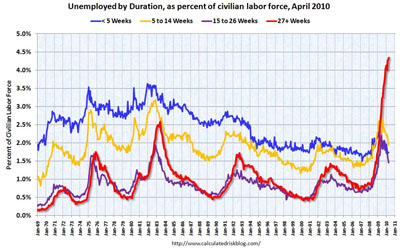Why is the media paying less attention to unemployment today than it did in 1983? I ran down a bunch of possible reasons yesterday, and one of them was this: “Maybe it has something to do with the fact that today’s stubbornly high numbers are concentrated among the long-term unemployed.”
I wasn’t quite sure what I had in mind when I wrote that, but the chart I included in yesterday’s post showed that, in fact, short-term unemployment had peaked about a year ago and come down pretty sharply since then. Long-term unemployment, by contrast, just kept skyrocketing. Today, nearly 4.5% of the population has been unemployed for more than six months, nearly double the previous record set in 1983, and it shows no signs of flattening out. Perhaps, I thought, that segment of the population was somehow less visible, or  less sympathetic, or less something that somehow translated into less media attention. Today, Catherine Rampell writes about this in the New York Times:
less sympathetic, or less something that somehow translated into less media attention. Today, Catherine Rampell writes about this in the New York Times:
Unemployment numbers show a notable split in the labor pool, with most unemployed workers finding jobs after a relatively short period of time, but a sizable chunk of the labor force unable to find new work even after months or years of searching. This group — comprising generally older workers — has pulled up the average length of time that a current worker has been unemployed to a record high of 33 weeks as of April. The percentage of unemployed people who have been looking for jobs for more than six months is at 45.9 percent, the highest in at least six decades.
Italics mine. Rampell’s story focuses on Cynthia Norton, 52, an administrative assistant in Jacksonville who’s been unable to find work for the past two years because companies have been shedding clerical workers during the recession and then finding that they can get along fine without them even when the economy improves. So Norton is working as a Wal-Mart cashier and she’s not happy about it:
Because of the Wal-Mart job, she has been ineligible for unemployment benefits, and she says she made too much money to qualify for food stamps or Medicaid last year. “If you’re not a minority, or not handicapped, or not a young parent, or not a veteran, or not in some other certain category, your hope of finding help and any hope of finding work out there is basically nil,” Ms. Norton says. “I know. I’ve looked.”
I’m not quite sure what conclusions to draw from this, but the recession’s extreme effect on a small class of long-term unemployed seems like it deserves more attention than it usually gets. What’s more, if that class is mostly 50-something workers, not 20-somethings, that’s significant too. Politically, it might explain why tea party activism — which skews older — has taken off so strongly, and economically it might explain….what? I need to noodle on that. But there’s something there.
















